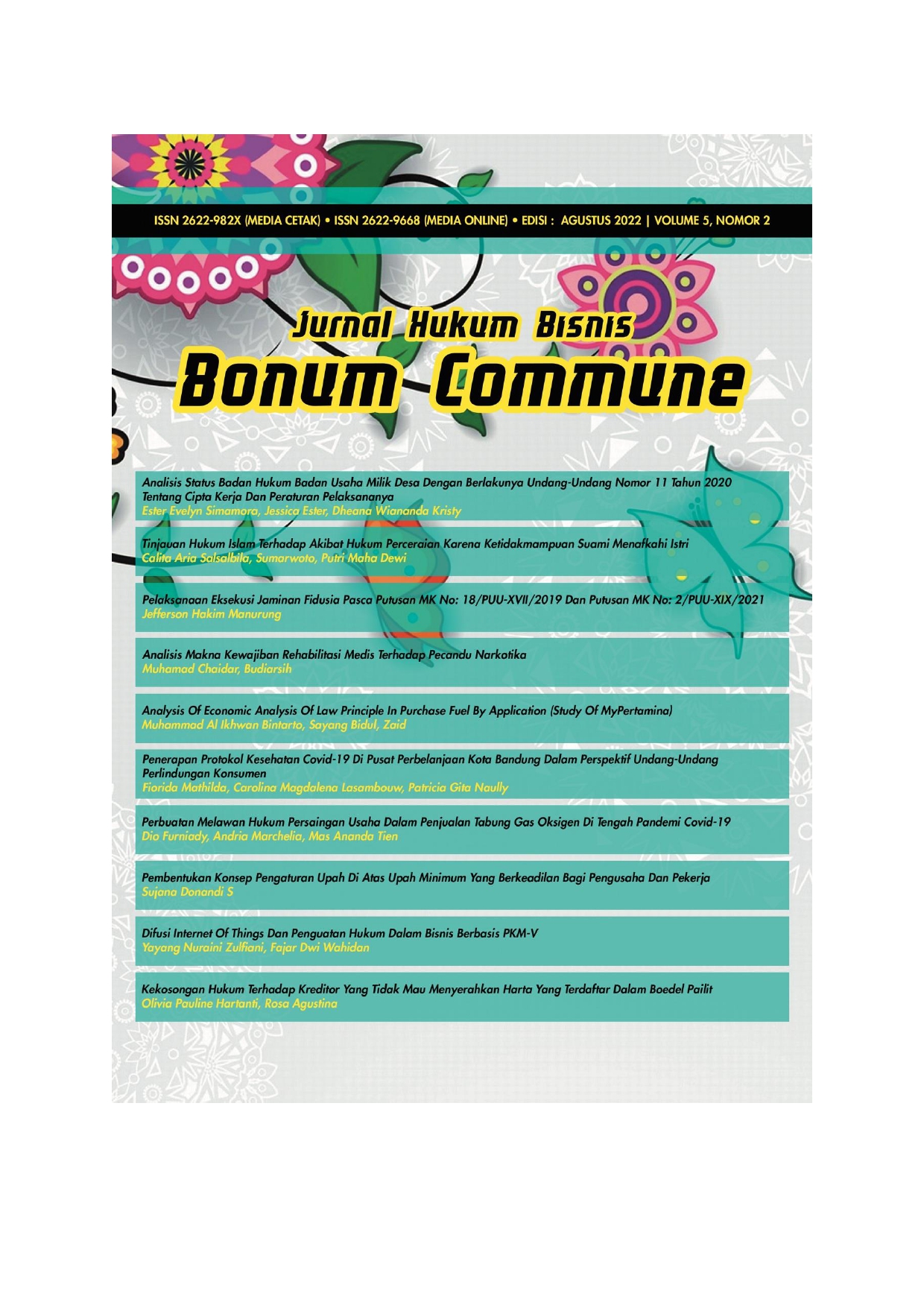KEWENANGAN NOTARIS DALAM PENERAPAN DAN PENGEMBANGAN HUKUM EKONOMI ISLAM DI INDONESIA
DOI:
https://doi.org/10.30996/jhbbc.v3i2.3331Keywords:
akta autentik, ekonomi syariah, notarisAbstract
The notary has an important role in the development of Islamic economics in Indonesia, where the notary has an extraordinary influence as well as in making an authentic deed that can produce legal certainty for the community. Law Number 30 of 2004 Juncto Law Number 2 of 2014 on the Position of Notary Public does not include the authority of a notary public in terms of making a deed of agreement relating to Islamic economics such as Islamic banking. The authority possessed by a notary in accordance with Law Number 30 of 2004 Juncto Law Number 2 of 2014 relating to the Notary is authorized to make an authentic deed regarding all deeds, agreements and stipulations required by legislation and / or as desired by the parties concerned to be stated in an authentic deed, guaranteeing the certainty of the deed, keep the deed, give a grosse, copy and quote the deed, all of it as long as the making of the Deed is not also assigned or excluded to other officials or other people determined by the law and other authorities. The regulation does not include notary authority in making notarial deeds related to sharia economics. Due to the development of the forms of agreements made by notaries, it is necessary to include a notary authority in making authentic deeds related to Islamic banking.
Keywords : Notary, Islamic economics, Authentic deed.
Downloads
References
L. Atika, “Sistem Penunjang Keputusan Penilaian Kinerja PemilihanDosen Berprestasi Menggunakan Metode AHP,†J. Ilm. MATRIX, vol. 12, no. 3, pp. 1–10, 2010.
Imaniyati, Neni Sri. 2013. Perbankan Syariah dalam Perspektif Ilmu Ekonomi, Bandung: Mandar Maju.
Mardani. 2011. Hukum Ekonomi Syari’ah Di Indonesia. Bandung: Refika Aditama.
Masriani, YuliesTiena. 2016. Urgensi Akta Notariil dalam Transaksi Ekonomi Ssyari’ah, Journal of Islamic Studies and Humanities Vol. (1), 1-20.
Mu’in, Abdul. 2019. Tanggung Jawab Notaris terhadap Kebenaran Data dalam Pembuatan Akad di Perbankan Syariah di Indonesia, Jurnal Al Amwal: Vol. 1 (2), 1.
Pradja, Juhaya S. 2012. Ekonomi Syariah. Bogor: Pustaka Setia.
Prajitno, Andi. 2018. Pengetahuan Praktis Tentang Apa dan Siapa Notaris di Indonesia. Surabaya: Putra Media Nusantara.
Purwaningsi, Endang. 2011. Penegakan Hukum Jabatan Notaris Dalam Pembuatan Perjanjian Berdasarkan Pancasila Dalam Rangka Kepastian Hukum, Jurnal Hukum FH Yarsi 2.
R. Soegondo Notodisoerjo. 2012. Hukum Notariat di Indonesia (Suatu Penjelasan). Jakarta: PT Raja Grafindo.
Subekti dan R. Tjitrosudibyo. 1992. Kitab Undang-Undang Hukum Perdata. Jakarta: Pradnya Paramita.
Subrata, Burhan. 2001. Perbankan Syariah. Jakarta: Serambi Ilmu Semesta.
Setyowati, Ro’fah. 2016. Notaris dalam Sengketa Perbankan Syariah, Jurnal Masalah Hukum, Jilid 45 No (2), 131-139.
Syahrul Borman. 2019. Kedudukan Notaris Sebagai Pejabat Umum Dalam Perspektif Undang-Undang Jabatan Notaris. Volume 3 Nomor 1.
Triyanta, Agus. 2016. Hukum Perbankan Syariah. Malang: Setara Press.
Yulianti, RahmaniTimorita. 2008. Asas-Asas Perjanjian (Akad) dalam Hukum Kontrak Syari’a ,Jurnal Ekonomi Islam Vol. II (1), 1.
Downloads
Published
Issue
Section
License
Authors who publish with Jurnal Hukum Bisnis Bonum Commune agree to the following terms:
- Authors transfer the copyright and grant the journal right of first publication with the work simultaneously licensed under a Creative Commons Attribution-ShareAlike 4.0 International License.. that allows others to share the work with an acknowledgement of the work's authorship and initial publication in this journal.
- Authors are able to enter into separate, additional contractual arrangements for the non-exclusive distribution of the journal's published version of the work (e.g., post it to an institutional repository or publish it in a book), with an acknowledgement of its initial publication in this journal.
- Authors are permitted and encouraged to post their work online (e.g., in institutional repositories or on their website) prior to and during the submission process, as it can lead to productive exchanges, as well as earlier and greater citation of published work (See The Effect of Open Access)














